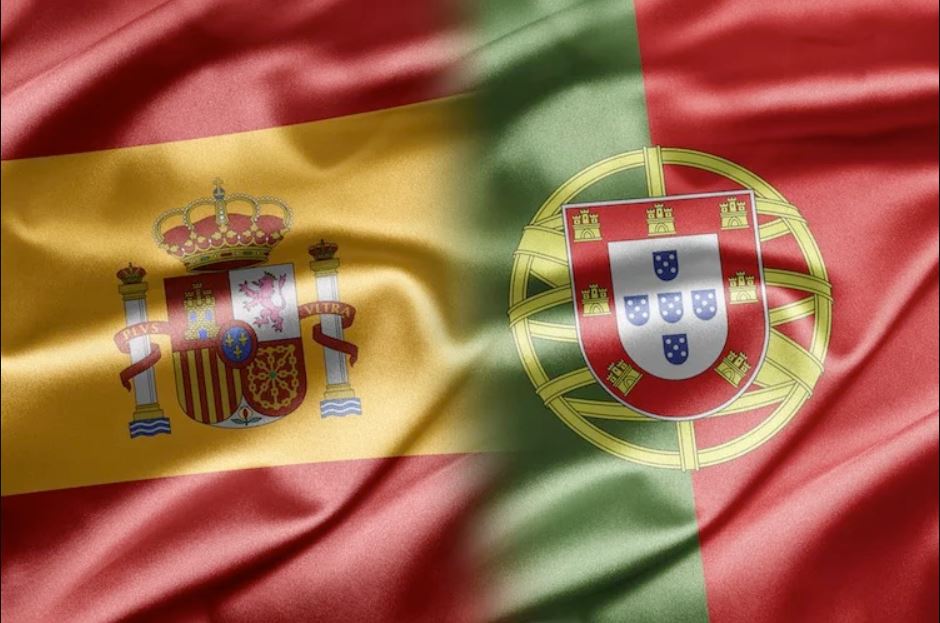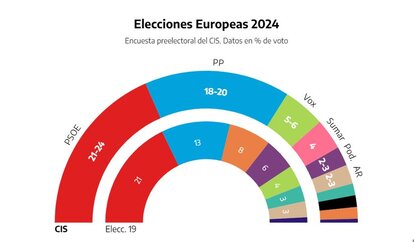European Elections, Spain, Portugal
European Elections 2024: The Outlook on the Iberian Peninsula

Focus on Spain
For Spain, this election is of great importance, as it not only concerns Spain's future in Europe but also the governing capability of the current government. Therefore, this election will be pivotal for the national party landscape.
Relevant Parties and Candidates
- Partido Popular (PP): The Christian-conservative party's campaign focuses primarily on peace, migration, and a pro-European stance. Their platform states: "Europe faces four major challenges: the democratic challenge, the social challenge, the economic challenge, and the geostrategic challenge." The party is cautious about digitalization, particularly recent developments in artificial intelligence. The PP will continue to be part of the European People's Party (EPP) group in the European Parliament. Lead candidate Dolores Monserrat has been the EPP group's deputy spokesperson in the European Parliament since 2019.
- Partido Socialista Obrero Español (PSOE): In 2019, it was by far the strongest party in Spain's European elections. A poor performance could weaken the position of Spanish Prime Minister Pedro Sánchez. Additionally, a poor result would jeopardize the strong position of the Spanish Socialists in the S&D (Progressive Alliance of Socialists and Democrats) group in the European Parliament. Lead candidate Teresa Ribera, a lawyer and third Vice President of the Madrid government and Minister for Ecological Transition and Demographic Challenge, focuses her campaign on the energy transition to renewable energies, social justice, and the reindustrialization of the European economy. The influential energy and environmental politician has already expressed interest in a position in the Commission.
- Ciudadanos (Cs): The liberal party's campaign emphasizes a competitive economy and a sustainable EU. Ensuring energy independence from autocratic states like Russia and securing supply in the long term is a key issue. Lead candidate Jordi Cañas stresses the urgency of a humane, responsible, and intelligent migration policy for the European community. He calls for greater integration of young people's interests into European decision-making processes.
- Vox: The right-wing populists are on the campaign trail. Over the recent Pentecost weekend, a major event was held where right-wing populists from around the world gathered to gear up for the European election campaign. Among those present were Argentine President Javier Milei and French politician Marine Le Pen. Before an audience of over 10,000, Milei criticized the Spanish government and sharply attacked the wife of Prime Minister Pedro Sánchez (PSOE). These remarks led to diplomatic tensions between Spain and Argentina, with the Spanish Foreign Minister summoning the Argentine ambassador and threatening further measures. Italian Prime Minister Giorgia Meloni and Hungarian Prime Minister Viktor Orbán also participated via video message.
Vox focuses primarily on migration, the "restoration of the sovereignty of European nations," workers' rights—with a particular emphasis on agriculture—and increased protection of EU external borders. It is not expected that lead candidate Jorge Buxadé will debate leaving the EU. Instead, he is likely to focus on "a Europe of sovereign nations." The lead candidate is a prosecutor and university professor.
[1] https://www.pp.es/actualidad-noticia/manifiesto-elecciones-europeas-2024
Current Polling Results

Aktuellen Umfragen zufolge kommen die Sozialdemokraten auf 34 Prozent, was bedeuten würde, dass sie zumindest ihre Sitzzahl von 2019 (21) halten könnten. Die Volkspartei Partido Popular könnte ihre Stimmenzahl mit gut 29 Prozent mehr als verdreifachen und käme hinter den Sozialdemokraten auf den zweiten Platz. In anderen Umfragen liegen Konservative und Sozialdemokraten allerdings deutlich näher beieinander, so dass es bis zur Wahl spannend bleibt, wer in Spanien die stärkste Kraft sein wird.
Aktuell versucht die PP Wähler von der rechtsradikalen Vox abzugreifen, indem sie gezielt das Thema Migration mehr bespielt, ob das eine Auswirkung auf den Wahlausgang haben kann, wird sich schlussendlich erst am Wahltag zeigen.
According to current polls, the Socialists are at 34 percent, which would mean they could at least maintain their 2019 seat count (21). The Partido Popular could more than triple its votes with around 29 percent, placing it second behind the Socialists. In other polls, Conservatives and Socialists are much closer, making it uncertain which party will be the strongest in Spain. Currently, the PP is trying to attract voters from the far-right Vox by emphasizing migration issues. Whether this will impact the election outcome will only be seen on election day.
The far-right party Vox is polling at 9 percent, potentially gaining one to two additional seats in parliament. The liberal party Ciudadanos is fluctuating in the polls and faces significant losses. In the last European election in 2019, it secured 12 percent, but now polling institutes predict a result between 1 and 2.2 percent.
Outlook
For liberal forces in Spain, particularly Ciudadanos, the European elections offer a chance to regain relevance in the Spanish party landscape. Their vision of a united, sustainable, and competitive Europe can resonate with voters if communicated effectively. Currently, Spain lacks a relevant liberal party. Focusing on the economy, youth, sustainability, and intelligent migration policy could distinguish them from other parties, recapture former voters, and attract new ones.
A strong result for the liberals could lead to a stronger voice for reforms and modernization in Europe. However, the party must regain strength, as it currently stands on the brink of insignificance. After not contesting the last parliamentary elections in Spain, many of their core voters are disappointed and have defected. Reaching the 12 percent in the last European elections and the 15.9 percent in the April 2019 parliamentary elections seems unlikely. Many prominent politicians have moved to the conservative PP, leaving the liberals in Spain weak in personnel.
It remains to be seen if the liberals can rally in the final weeks and secure a return to the European Parliament. Current polls leave this question open.
[1] https://resultados.elpais.com/elecciones/2010/autonomicas/09/index.html
Snapshot from Portugal
In early June, Portugal will also elect its new EU Parliament members, and it is worth taking a closer look at the political scene in Portugal ahead of these elections. The Portuguese party system is highly diverse and characterized by various party alliances that form according to the political climate. Notably, the relatively young liberal party "Iniciativa Liberal" has been steadily gaining public support.
Key Parties and Candidates
Partido Socialista (PS)
The Partido Socialista, part of the Progressive Alliance of Socialists and Democrats in the European Parliament, is a social-democratic, left-wing party. Although it held the Prime Minister's office for a long time in the past, public satisfaction with the Socialists' policies declined, leading to their defeat in the last election. Under the leadership of top candidate Marta Angst, the PS's platform focuses on social equality and greater solidarity among EU member states. Additional priorities include defending common EU values, promoting green and energy-independent policies, advancing digitalization, and establishing a cohesive international migration management strategy.
Democratische Allianz (AD)
The Aliança Democrática is a center-right coalition that varies in composition depending on the country's political mood. Currently, the AD leads the polls, slightly ahead of the Socialists. The alliance comprises the PSD, CDS, and PPM parties.
Partido Social Democrata (PSD)
The Partido Social Democrata, currently holding the Prime Minister's office, is a liberal-conservative party and part of the European People's Party in the European Parliament. The PSD has a strong base and a long tradition in Portuguese politics.
Partido Popular
CDS - Partido Popular is a right-wing conservative party that also plays a significant role in Portugal's political landscape.
Monarchistische Volkspartei (PPM)
This monarchist party is politically insignificant, holding no parliamentary seats.
Aliança Democrática
Lead candidate Sebastian Bugalho heads the Aliança Democrática coalition with a campaign focused on European security policy and economic development.
Iniciativa Liberal (IL)
The Iniciativa Liberal, a member of the Alliance of Liberals and Democrats for Europe (ALDE), has established itself as a liberal force in Portugal. In the recent parliamentary elections, it secured eight seats. Under the leadership of João Cotrim Figueiredo, the IL presents a forward-thinking platform advocating tax cuts, reducing bureaucracy, and privatizing the state airline. Economic growth should be a political priority in the EU, with ecological sustainability balanced with economic progress. Other key points include strengthening the EU internal market, promoting entrepreneurship, free trade agreements, multilateralism, sustainable social systems, and social security. The IL is economically robust and offers many
progressive ideas that can lead to a liberal and sustainable Europe, both economically and ecologically.
Chega!
Chega! is a far-right, populist party. Its lead candidate, António Tânger Corrêa, emphasizes the necessity of Portugal remaining in the EU but calls for less federalism within the Union and greater sovereignty for individual states. Other key points of the party's platform include increased protection of the EU's external borders, migration, and security.
Bloco de Esquerda (BE)
The Bloco de Esquerda is a leftist coalition that is critical of the EU and globalization. Catarina Martins leads the party with a platform focusing on climate, social justice, pensions, and wages.
LIVRE
LIVRE is a left-green party advocating for a pro-European community. Lead candidate Rui Tavares promotes a platform calling for more solidarity and equality among member states.
Current Political Situation in Portugal
The political landscape in Portugal is characterized by a broad spectrum of parties that cooperate to limit the influence of the far-right. In the last elections, right-wing parties gained significant votes, prompting established parties to increase their cooperation. Meanwhile, voter turnout in Portugal continues to decline, posing a challenge for democracy.
Special attention is due to Iniciativa Liberal (IL). With its clear focus on economic reforms and sustainable growth, the IL could play a decisive role in the upcoming European elections. With innovative approaches and strong economic policies, it stands out in Portugal and beyond. Many voters are looking for a party that represents genuine change and a positive future outlook. Iniciativa Liberal offers just that.
The liberals have the potential to significantly influence Portugal's political landscape and steer the country toward economic growth and social security. With fresh ideas and a commitment to the prosperity of all citizens, they can make a positive contribution to the development of both Portugal and Europe.
